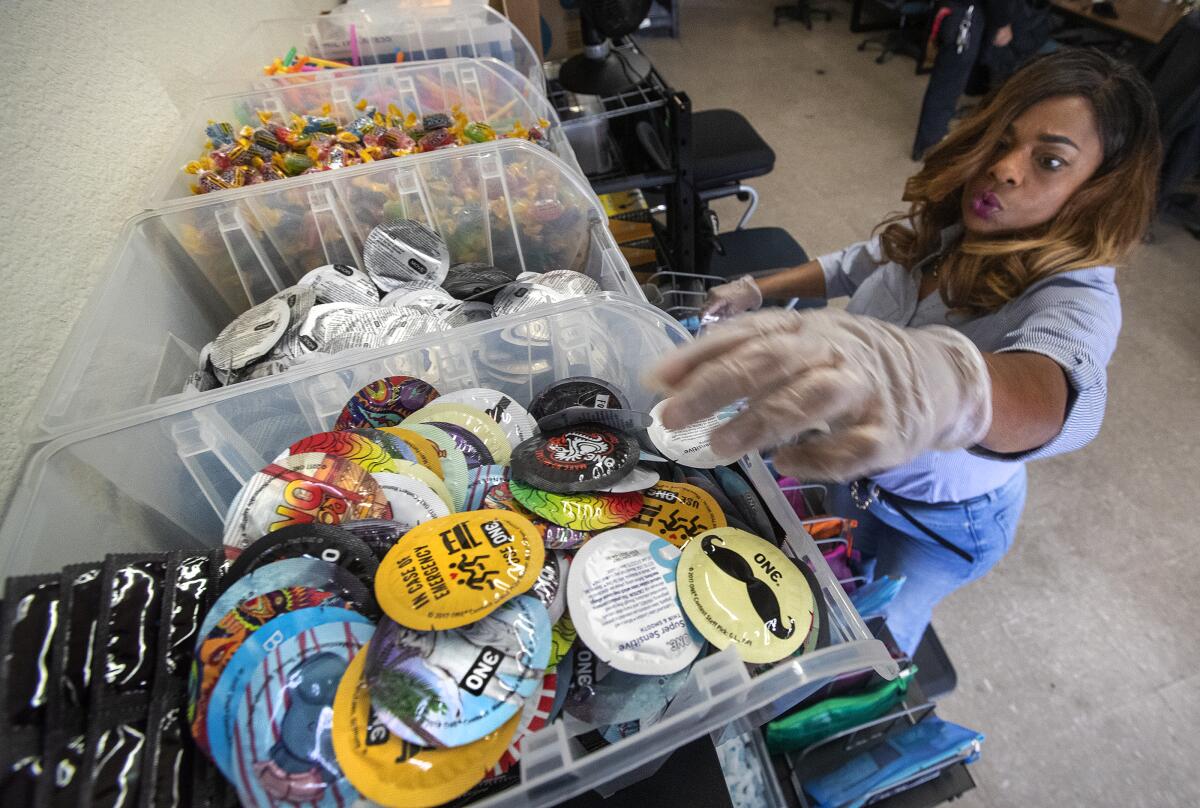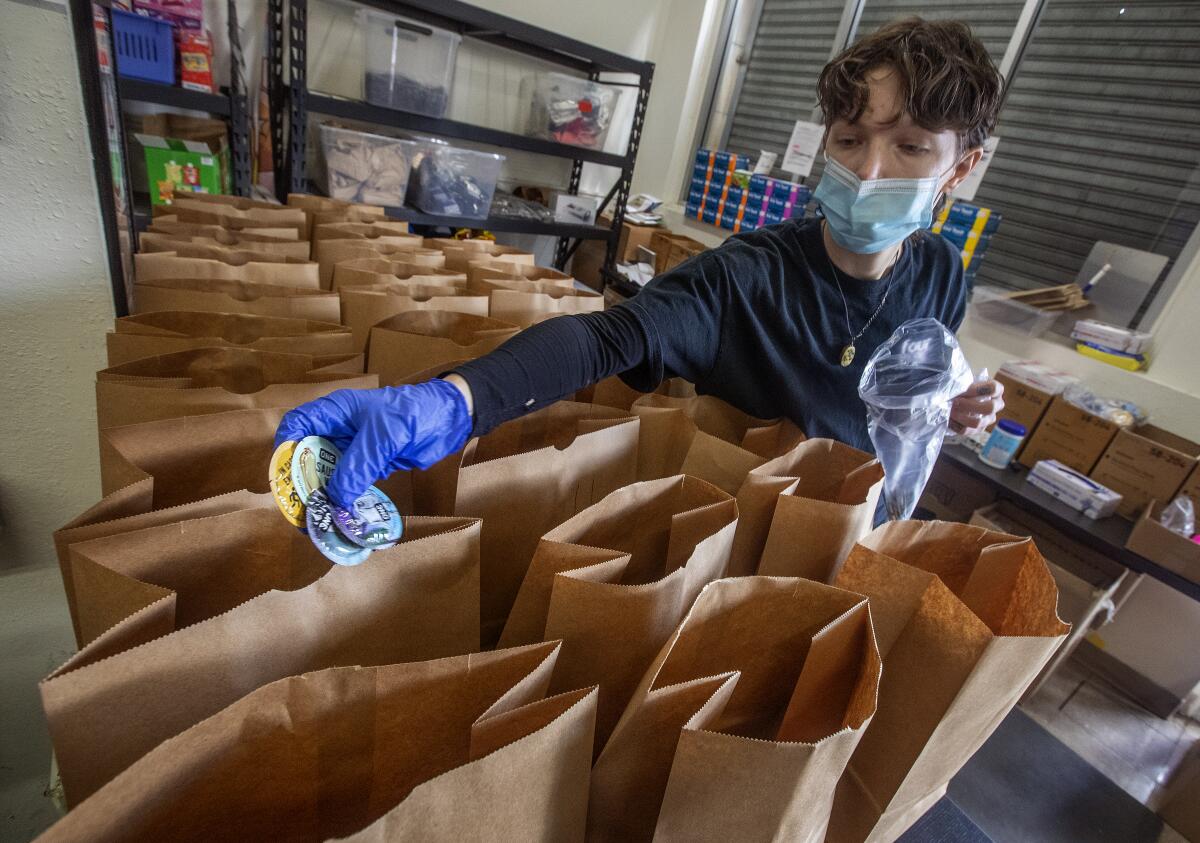‘So frustrating’: L.A. County condom program has faced delays, complaints

- Share via
In December, Spider Davila pleaded with a Los Angeles County employee for help.
“Can you let them know that we are out of condoms,” wrote Davila, who works for Community Health Project LA, which provides condoms and other health supplies on the streets. The group had turned to a county program that provides free condoms to be handed out by businesses and community groups, but its emails were going unanswered.
Sex workers “will not be given condoms in the middle of a syphilis emergency because I can’t even get a reply,” Davila wrote in an email. “Can you ask them to PLEASE, PLEASE, PLEASE write me back and deliver our condoms and lube?”
The December plea was only the latest from Community Health Project LA and other organizations that have relied on the county program for free condoms to stop the spread of sexually transmitted infections such as gonorrhea and syphilis that surged amid the pandemic.
The L.A. Condom program is run by Audacy, an audio and entertainment company, under a county contract that pays $700,000 annually for buying condoms, paying salaries and other program costs. Emails obtained by The Times through a public records request show that over the past year, local organizations have complained about emails going unanswered and condom orders being delayed for weeks or even months.

Audacy declined to comment. L.A. County Public Health said in a statement that over roughly a year and a half, there had been five instances when issues were raised with the program, including technical and communication problems and issues with condom supplies.
As Audacy or the public health department became aware of those issues, “every effort was made to immediately assess, troubleshoot, and resolve them,” and a number of changes have been made to prevent gaps in condom availability, the department said. Several community groups told The Times they had seen marked improvements in recent weeks.
The county agreement with Audacy, formerly known as Entercom, was due to end last summer. Instead, the public health department opted last June to extend it for another year.
The department said in a statement that it had decided to do so to avoid gaps in services, because the bidding process could take 12 to 18 months and it had limited bandwidth during the COVID-19 pandemic. The program has already distributed more than 1 million condoms during that extension, exceeding its annual goal in seven months, the public health department said.
In interviews, some local nonprofits said they had spent their own money to buy condoms after encountering delays and unresponsiveness from the L.A. Condom program in the past. “We’ve been wasting funding that could be utilized for other supplies,” said Oscar Arellano, harm reduction program manager at Homeless Outreach Program Integrated Care System. He estimated that he had spent hundreds of dollars a month on condoms that could otherwise be spent on sterile needles or other health supplies.
Each time that an order is submitted, “I just feel like it’s a lost order,” Arellano said in an interview earlier this year. “I don’t know when it’s going to arrive.”
At Community Health Project LA, Davila said in an interview that they were “grateful the program exists at all.”
But when their supplies ran out this winter, “we paid $700 for condoms out of our pocket,” Davila said, “which is really unfortunate because that money should go towards other things for our participants.”
Public health officials met with Audacy employees last March to go over concerns. In an email summarizing their discussion, Audacy representative Matthew Gall faulted recent disruptions in the global supply chain, including a Malaysian factory being hit hard by COVID-19, and a switch in servers at Audacy that “temporarily disrupted communications,” which he said had been resolved.
Yet complaints continued. In April, a representative from another L.A. County agency — its Department of Health Services — reached out to the Department of Public Health after failing to get several orders for a COVID response team for unhoused people. A public health employee told Audacy that “it looks like they have been trying to order since January with no luck.”
That same month, Community Health Project LA said more than three weeks had passed after placing an order, and it was “down to less than one box” of condoms, emails show. In June, a Venice Family Clinic worker reached out to the public health department, saying the program website was down, and “I have been trying to reach LA Condoms for some condoms for our program with no luck.”
Around that same time, another public health employee raised concerns that a group serving sex workers had repeatedly applied for the condom program but had not heard back; it turned out they had initially been denied because of a misunderstanding. A public health employee suggested that perhaps groups could be emailed if they were rejected.
At the end of August, Community Health Project LA said it hadn’t gotten an order after nearly a month and was out of condoms; Gall at Audacy said its condom supplier had been suffering a backlog and undergoing staff changes, and that he was offering the group some of their in-house stock of condoms to hold them over, emails show.
But a few months later, Davila was again pleading for a response after not hearing back about an order, calling the program “so frustrating.” By December, when Davila made their complaint, one L.A. County public health employee had had it.
“I cannot in good conscience recommend this website to our partner organizations anymore if this is going to be the result,” one employee in its HIV and STD programs division wrote to her co-workers. “I thought we got a new vendor for this program and that issues were getting resolved, but that doesn’t seem to be the case.”
“These organizations are serving an incredibly high risk population,” the employee wrote in an email. “We should be doing everything in our power” to keep them stocked with condoms.
One of her co-workers replied that it seemed like most agencies were getting the condoms they requested, but “there are still instances where it’s not working,” despite repeated meetings with Audacy. She suggested asking for a “formal plan of action” and floated the possibility of holding back on payments — an idea quickly rejected by a manager in the STD division.
Audacy was the sole bidder to operate L.A. Condom when a solicitation opened in January 2019, according to the county public health department. The county said that to improve the program, its HIV and STD division and Audacy had rolled out new features, including a new platform that notifies community groups at each step of the ordering process and allows Audacy to track information to ensure that packages are delivered. In January, Audacy started holding meetings every two weeks with its condom vendor to track and address supply issues, the department said.
Audacy also hired an additional staffer last July to help manage the program and reached an agreement with an alternative supplier in September in case the current one cannot meet the demand, the public health department said. And it decided to approve bigger orders for groups that use the program most frequently, so that they are less likely to run out.
“While we are proud that the L.A. Condom Campaign has distributed nearly 18 million free condoms over the last decade, we remain committed to further expanding the reach and responsiveness of this critical public health program,” the department said in a statement.
Community groups said things had improved in recent weeks: Davila said that Community Health Project LA recently got a delivery of 30,000 condoms. Arellano said he had recently heard from an L.A. Condom representative who “responded within days.”
Venice Family Clinic, however, was unable to weigh in. Its Common Ground program buys its own condoms now, spending roughly $2,500 a year to do so, because “it was easier than going through a program,” a clinic spokesperson said.
More to Read
Sign up for Essential California
The most important California stories and recommendations in your inbox every morning.
You may occasionally receive promotional content from the Los Angeles Times.











